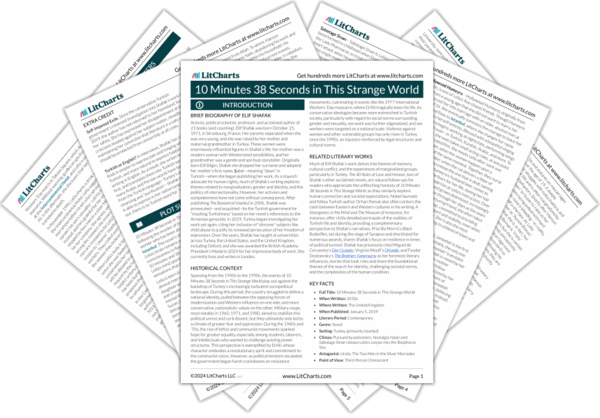Kilyos’s Cemetery of the Companionless, where Leila’s body is initially buried, symbolizes the systemic dehumanization of Turkey’s marginalized people. It is a place where the unwanted and unclaimed are laid to rest—those without family, identity, or significance, according to society’s narrow perspective. Leila’s burial here after her murder underscores how she has been continually denied dignity, even in death, because of her status as a sex worker.
Though some graves are marked by wooden planks bearing numbers, the cemetery lacks tombstones, names, and other individual markers. No funerals are held here, and it rarely receives visitors. This cemetery is the physical embodiment of a dehumanized existence: bodies are dumped into the earth and immediately forgotten, surrounded only by other nameless bodies. However, the decision of Leila’s friends to exhume her body and give her a proper funeral challenges the idea that those buried in this place are ever truly “companionless”—a label that reflects the narrow beliefs of those in charge, rather than objective facts about the people buried in the cemetery. Ironically, the souls in the Cemetery of the Companionless ultimately comprise their own community, eternally united in their shared experiences of being cast out and dehumanized.
The Cemetery of the Companionless Quotes in 10 Minutes 38 Seconds in This Strange World
Clothing: a gold-sequinned dress (torn), high-heeled shoes, lace underwear. A clutch bag containing an ID card, a lipstick, a notebook, a fountain pen and house keys. No money, no jewellery (might have been stolen).
The time of death is estimated to be between 3:30 a.m. and 5:30 a.m. No sign of sexual intercourse detected. The victim was beaten with a heavy (blunt) instrument and strangled to death after being knocked unconscious.

Unlock explanations and citation info for this and every other 10 Minutes 38 Seconds in This Strange World quote.
Plus so much more...
Get LitCharts A+“Look, maybe for believers like you the body is trivial . . . temporary. But not for me. And you know what? I’ve fought so hard for my body! For these”—she pointed to her breasts—“for my cheekbones . . .” She stopped. “Sorry if that sounds frivolous. [...] But I need you to see that the body matters too.”
[...] it seemed to Nalan that religion—and power and money and ideology and politics—acted like a hood too. All these superstitions and predictions and beliefs deprived human beings of sight, keeping them under control, but deep within weakening their self-esteem to such a point that they now feared anything, everything.
“Nice to see you, finally,” said the fish. “What took you so long?”
[...]
Smiling at her confusion, the blue betta fish said, “Follow me.”
Now finding her voice, Leila said, with a shyness she could not conceal, “I don’t know how to swim. I never learned.”
“Don’t worry about that. You know everything you need to know.”












